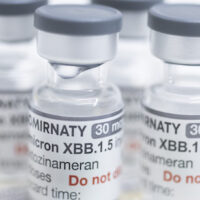A CDC advisory panel vote to recommend against use of seasonal influenza vaccines containing small amounts of thimerosal followed a presentation that misled on the risks of the rarely used preservative. There isn’t evidence that thimerosal in vaccines is harmful, and studies assessing a variety of health problems, including neurological conditions, have supported its safety.
Issues: vaccine ingredients
Sen. Mullin’s Misleading Vaccine Testing Claim
Posts Raise Unfounded Concerns About Aluminum in Vaccines
Small amounts of aluminum have been used for many decades to strengthen the immune response to vaccines. Exposure to high levels of aluminum has been associated with brain and bone problems, but there is no evidence that the level of exposure provided by vaccines leads to such toxicity, contrary to social media claims.
Posts Spread False Claim About Moderna Patent Application
The mRNA COVID-19 vaccines — like many other vaccines — can contain small amounts of DNA left over from the manufacturing process. There’s no evidence this residual DNA causes “turbo cancer,” or very aggressive cancer. Nor did Moderna admit that “mRNA Jabs Cause Turbo-Cancer,” contrary to an online article that misconstrues a line from a patent application.
COVID-19 Vaccines Have Not Been Shown to Alter DNA, Cause Cancer
Small amounts of DNA from the manufacturing process may remain in the mRNA COVID-19 vaccines. Purification and quality control steps ensure any leftover DNA is present within regulatory limits. There isn’t reason to think that this residual DNA would alter a person’s DNA or cause cancer, contrary to claims made online.





